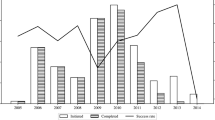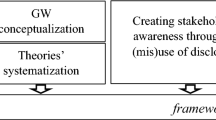Summary and conclusions
In the preceding analyses of rent-defending, the Posner model yielded welfare losses in excess of the combined areas of the Tullock rectangle and the Harberger triangle in only one instance. Furthermore, this particular circumstance necessitated voluntary participation in a game with a negative expected value.13 For the Tullock-Rogerson model, the explicit addition of rent-defenders had no impact on aggregate dissipation.
In addition, this paper introduced two implications of nested games on rent-seeking theory. First, in cases where the Posner expected value bid applies, coalitions will not form. Second, coalitions arise as a result of wealth-maximizing behavior in the Tullock-Rogerson strategic game, but contrary to previous authors this model suggests, rent-seeking expenditures fall. However, the organizational and enforcement costs of coalitions reduces the welfare gain and under some circumstances may negate the gains to coalition formation.
There seem to be two common pitfalls in the analysis of welfare costs of rent-seeking activities. First, the rent at stake is often incorrectly identified. Second, the method used to allocate rents, or the structure of the game, is not explicitly formulated. Viewing rent as claims to property rights should help alleviate the problems arising from the former, and continuing research into alternative rent-seeking models represents a movement toward the latter.14
Similar content being viewed by others
References
Becker, G.S. and Stigler, G.J. (1974). Law enforcement, malfeasance, and compensation of enforcers. Journal of Legal Studies 3: 1–18.
Cherkes, M., Friedman, J. and Spivak, A. (1986). The disinterest in deregulation: Comment. American Economic Review 76: 559–563.
Concoran, W.J. (1984). Long-run equilibrium and total expenditures in rent-seeking. Public Choice 43: 89–94.
Concoran, W.J. and Karels, G.V. (1985). Rent-seeking behavior in the long run. Public Choice 3: 227–246.
DeLorme, C.D., Jr. and Snow, A. (forthcoming). On the limits to rent-seeking waste. Public Choice.
Fisher, F.M. (1985). The social costs of monopoly and regulation: Posner reconsidered. Journal of Political Economy 93: 410–416.
Gahvari, F. (1989). Licensing and nontransferable rents: Comment. American Economic Review 79: 906–909.
Higgins, R.S., Shughart II, W.F. and Tollison, R.D. (1985). Free entry and efficient rent-seeking. Public Choice 46: 247–258.
Hillman, A.L. and Riley, J.G. (1989). Politically contestable rents and transfers. Economics and Politics 1: 17–40.
Kruger, A.O. (1974). The political economy of rent-seeking. American Economic Review 64: 291–303.
Lott, J.R. and Roberts, R.D. (1989). Why comply?: One-sided enforcement of price controls and victimless crime laws. Journal of Legal Studies 18: 403–414.
Magee, S.C. (1984). Endogenous tariff theory: A survey. In D.C. Colander (Ed.), Neoclassical political economy, 41–51. Boston: Ballinger.
Paul, C. and Wilhite, A. (1990). Efficient rent-seeking under varying cost structures. Public Choice 64: 279–290.
Posner, R.A. (1975). The social costs of monopoly and regulation. Journal of Political Economy 83: 807–827.
Rogerson, W.P. (1982). The social costs of monopoly and regulation: A game theoretic analysis. The Bell Journal of Economics 13: 391–401.
Tullock, G. (1967). The welfare costs of tariffs, monopolies and theft. Western Economic Journal 5: 224–232.
Tullock, G. (1980). Efficient rent-seeking. In J. Buchanan, R.D. Tollison, G. Tullock (Ed.), Toward a theory of the rent-seeking society, College Station: Texas A&M Press.
Tullock, G. (1984). Long-run equilibrium and total expenditures in rent-seeking: A comment. Public Choice 43: 95–97.
Tullock, G. (1985). Back to the bog. Public Choice 46: 259–263.
Tullock, G. (1987). Another part of the swamp. Public Choice 54: 83–84.
Ursprung, H. (1989, March). Rent-seeking for public goods and candidate competition. Paper presented at the annual meeting of the Public Choice Society.
Wenders, J.T. (1987). On perfect rent dissipation. The American Economic Review 77: 456–459.
Author information
Authors and Affiliations
Additional information
The authors wish to thank Randall Holcomb, Philip Porter, William Shugart and Gordon Tullock for helpful comments on an earlier version. Naturally remaining errors are the responsibility of the authors.
Rights and permissions
About this article
Cite this article
Paul, C., Wilhite, A. Rent-seeking, rent-defending, and rent dissipation. Public Choice 71, 61–70 (1991). https://doi.org/10.1007/BF00138451
Received:
Accepted:
Issue Date:
DOI: https://doi.org/10.1007/BF00138451




